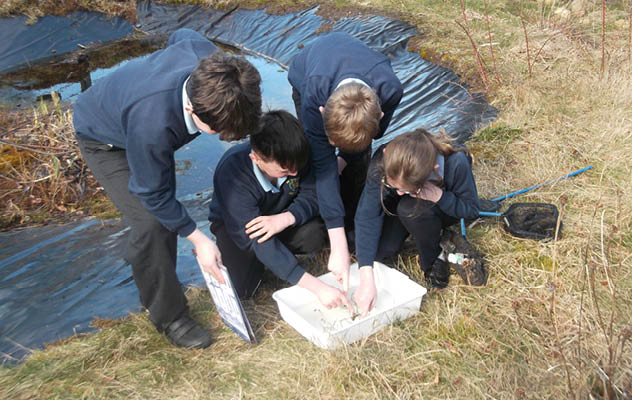
Vicky Sharkey is from Dr Thomlainson C of E middle School and is one of 50 teachers to win £1,000 for their school as a result of their entry in the Rolls-Royce Science Prize. In this article she outlines her entry for the prize and the effect it has had on her school.
I have been a science teacher for nearly 15 years. I never wanted to be a teacher and came into it by accident when I helped with reading at my sons’ first school. I started teaching as I had a passion to help young people become inspired and motivated by the world around them and want to be scientists themselves.
Our project, entitled “The Nature of Learning” fulfils this passion by taking learning outdoors, not just in science but in other subjects too. As a middle school in Northumberland, with pupils in both KS2 and KS3, we believe it is important to capture the wonder and awe of the world around us. Our newly launched enquiry based curriculum provides many opportunities to incorporate outdoor learning as well as cross-curricular links that enable pupils to see the whole picture when it comes to learning, hence the project title. The Rolls-Royce Science Prize prize money will make a tremendous difference to how quickly our project will develop over the forthcoming year.
Some of the projects we are planning this year include:
- mini beasts –mega beasts, studying the local insects and their habitats in science and then making models of them using the natural materials around school in Art lessons
- geography and science together will look at renewable and non-renewable energy resources, going wider afield to investigate hydro-electricity at nearby Cragside House (first house in the world to be lit by HEP) and a local wind farm. This will finish with pupils designing and building their own wind turbines in school.
- make a trail for guided reflection in RE and develop an outdoor prayer space
- in mathematics under the heading “Is God a mathematician?” Pupils will investigate symmetry in nature, measure heights of trees using geometry and circumferences of trees in order to look for correlations
- linking literacy, design and technology and history, we will recreate an air raid and take pupils to a safety zone (Forest School) where they will recreate an air raid shelter using natural materials
- in Modern Foreign Languages (MFL), pupils will be learning about shops and towns and learning how to follow directions by carrying out a treasure hunt around school using QR codes. This way they will learn new vocabulary in a fantastic environment.
Over the past year we have developed our Forest School area and this is proving to be an essential resource in delivering outdoor learning. In science we are rebuilding our pond and wildlife garden to attract our local wildlife including Bob, our friendly woodpecker, who loves the bird food outside the lab windows!
Using science skill to aid the transition from feeder first schools
Part of our project is also getting the younger pupils in our feeder first schools to get involved in a transition project linking science and art. Pupils will be taking photographs of our school environment including the diverse habitats we have, studying the plants and animals that live there and then creating an alien being to live in one of these habitats around school. The idea for this is to encourage them to think of the skills and attributes they need to “be an alien being” in school, such as sense of direction, good communication, respect and resilience. Pupils will then apply these to themselves in order to cope with transition better.
The project was inspired by the National Science Learning Centre CPD activity on Leading Science in the Outdoor Classroom.
The first part of the course gave me the inspiration I needed to undertake such a whole-school changing project such as this. It also gave me the confidence to try out new activities and the resources that I needed to get started. If you are thinking of outdoor learning as a way of delivering the new KS2 curriculum or want to develop a more holistic approach to teaching KS2 then these websites have tons of useful resources to get you started:
If you want to follow what we are doing this year, then here is the link to our website for further details of our project, photos and plans for the future too.

